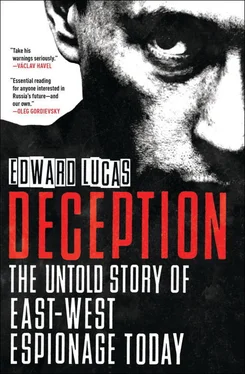The puzzling loose ends from the tragedy were partly tied together in 2005 when a Swedish customs official claimed that the shipments of classified material in the weeks before the sinking had indeed taken place under a special arrangement with the defence authorities. Rather shamefacedly, the Swedish authorities confirmed this, claiming that the operation had been authorised by an Estonian official whose name they had forgotten. Some intelligence sources say that the GRU indeed planted a bomb on a lorry carrying stolen Russian military technology on the fatal night. The aim was not to sink the vessel, but to cause a scandal that might stop future operations. By a savage fluke, the explosion on the lorry led to the failure of the Estonia ’s poorly maintained bow doors. Roll-on, roll-off ferries are inherently dangerous: water in the car decks can quickly render them unstable and prone to capsize very fast. As the water poured in, the ferry listed, turned over and sank, leaving most of the passengers with no time to get to the inadequate lifeboats.
Whatever the cause of the inrush of water, the investigation of the sinking was not a high point for transparency. 21Official diving expeditions at the wreck suggest an unusual degree of interest in a disaster that supposedly stemmed solely from mechanical failure. Independent attempts to investigate the wreck have been shooed away: it is now out-of-bounds as a marine mass grave, thanks to an international agreement signed (interestingly) by the United Kingdom (which had only one citizen perishing in the accident) as well as by Sweden, Finland, Estonia, Poland, Denmark and Russia. Neither Norway (six dead) nor Latvia (seventeen) signed the treaty. Survivors and the victims’ families remain suspicious that they were the collateral damage in a war of nerves between Russia and the West. Limited forensic tests conducted by outsiders have failed to prove any explosion conclusively. Though I am sceptical of conspiracy theories, the official explanation of simple mechanical failure does not fully convince me. If foul play was involved, blame would lie first and foremost with those who placed a bomb on a passenger ferry. Yet at a minimum, the proven fact that ferry passengers were repeatedly used, in effect, as human shields for spy games deserves forthright criticism. A lot more people died in the Estonia than in Operation Jungle.
In the chaotic conditions of the former Soviet Union in the early 1990s, Herman Simm was a reassuringly solid figure. In January 1967 he had taken the standard pledge of the Soviet police force, ‘I, a citizen of the USSR, hereby taking the oath of the Soviet Militsiya , do solemnly swear that I will serve faithfully to the end the Soviet people, Soviet homeland and Soviet government.’ Since then he had a stellar record of competence and hard work. He had forty-four awards, including three medals for exemplary behaviour. At a time when brusque Soviet official manners still plagued public service, he was polite and pleasant. As well as Estonian and Russian, he spoke excellent German with smatterings of other languages. Unlike many officials from the old days, he counted as a patriot. As head of security at Toompea Castle, the country’s seat of government, he had masterminded its defence against an assault by pro-Kremlin demonstrators on 15 May 1990 – the closest Estonia came to an armed clash during its struggle to regain independence. By his account, if the defence failed he stood ready to escort the country’s then prime minister, Edgar Savisaar, through a secret tunnel to the town below, where a speedboat would whisk him to safety in Finland. Later he claims to have ferried Estonia’s hard-currency reserves in suitcases to safety in Helsinki for the nascent central bank, forestalling a possible Soviet attempt to seize them. 1
After independence was restored in August 1991 Simm moved onwards and upwards, becoming in early 1993 the regional police chief in Harju County, the area around the capital, Tallinn. That was one of the hottest beats in Estonian policing: as well as dealing with endemic organised crime, toxic waste spills and smuggling, his patch included a Soviet nuclear submarine training base at Paldiski, which was still out of the control of the Estonian authorities and had become a magnet for organised crime. Simm supervised the withdrawal of Soviet nuclear fuel elements and the handover to the constitutional authorities. Two months later, he became the top police officer for the whole country, where he showed a courtier-like ability to ingratiate himself with the powerful and the up-and-coming. In interviews with dozens of former associates, the adjective that comes up repeatedly is ‘helpful’. One not particularly close colleague was startled when Simm, having learned of his upcoming wedding, offered the services of a patrol car and two police officers to direct the traffic and organise parking.
In 1995, Simm moved to the Defence Ministry, initially to a low-key job as head of the analysis bureau, where he stood out as an efficient bureaucrat. The then Defence Minister, Andrus Öövel, said proudly that hiring a former police chief for the young ministry was like ‘winning the lottery’. 2Few worried when Simm then added to his portfolio the handling of classified documents. It was an unpopular job: Estonia was plagued by scandals involving missing, supposedly secret, papers. Too many items were classified and the rules for safeguarding them were onerous and badly drafted. Simm’s bureaucratic habits, honed in the Soviet era, helped him sort out the chaotic paper flows inside a still half-baked bureaucracy. Estonia’s foreign friends, keen to see order prevail over chaos, quickly talent-spotted the new official as someone worth cultivating. Britain’s government (noting that his orientation was more towards Germany and Finland than to the Anglophone world) paid for him first to learn English at an intensive course at the Foreign Office language school and then to study security policy and practice at Chicksands in Bedfordshire, the citadel of Britain’s Defence Intelligence Service. 3On his return, he was a natural choice to oversee the ministry’s move to NATO’s security standards. His efforts received high marks: drills and tests showed Estonia’s ability to handle secrets to be first class – and indeed better than in some old members of NATO.
Once Estonia joined NATO in 2004, Simm, by now the ministry’s top security official, became a still more regular visitor to its Brussels headquarters. Although slightly handicapped by his stilted English – notably better suited to meetings than social events – his affable manner marked him out as one of the more welcome newcomers. Officials there remember an assiduous networker who used slightly heavy-handed flirtatiousness to good effect when dealing with female colleagues. He was prone to self-importance, seemed to feel that he was under-appreciated in Estonia, and liked to display a vocal anti-Russian streak. At home he oversaw security clearances, promotions and transfers for the country’s most important defence and security posts. He recommended people for courses in other NATO countries, and signed off on their requests to take part.
In Brussels, NATO saw nothing unusual. Simm met every criterion for the alliance’s top-secret clearance. A similar clearance at home was issued and checked regularly by Estonia’s Kapo (Security Police). 4But Simm’s record would have repaid closer scrutiny. Why, for example, had Sweden denied him a visa in the mid 1970s? His background, the result of a brief post-war liaison between a middle-aged lawyer and a young woman, then brought up by aunts, and having multiple marriages and partnerships in adult life, could have suggested personality flaws of the kind a canny intelligence officer can exploit. A Soviet-era police officer who had travelled regularly abroad could hardly have escaped contact with the KGB. Yet Simm had declared no such thing. That should have prompted both thorough scrutiny of the files and the question of whether he might be vulnerable to blackmail. In fact, he had had his first contact with the KGB Third Department (which dealt with military counter-intelligence) in 1968, as part of a routine sounding out of all recruits to the law-enforcement organs. Had the investigators dug deep enough in the KGB files (as they did later, once Simm was under suspicion), they would have found that the Soviet secret police formally recruited Simm in 1985, and that he had brazenly denied this collaboration in a declaration in 1992.
Читать дальше












